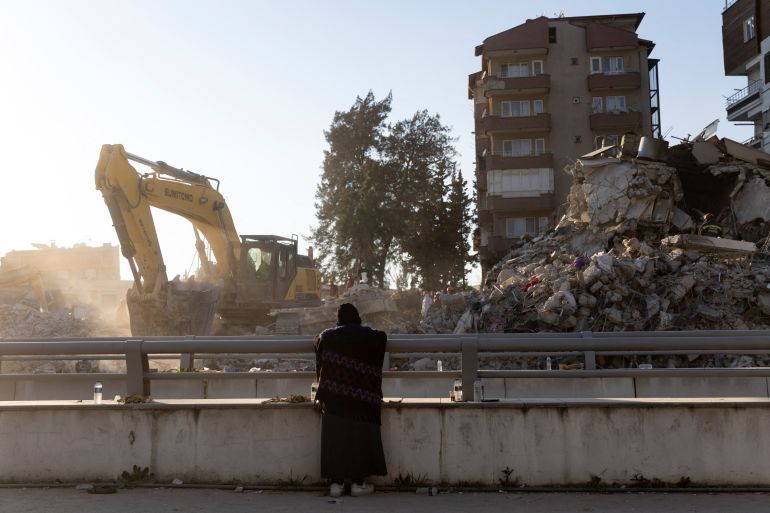Earthquake death toll surpasses 46,000 in Syria, Turkey
Rescue teams are still finding survivors under the rubble of destroyed buildings.

Twelve days after a devastating earthquake hit Turkey and Syria, more than 46,000 people have died and more than 84,000 buildings have either been severely damaged, need urgent demolition, or collapsed, according to officials.
As Turkey attempts to manage its worst modern disaster, concerns are growing over the victims of the tragedy in Syria, with the World Food Programme (WFP) pressuring authorities in the northwest to stop blocking access to the area as it seeks to help hundreds of thousands of people ravaged by earthquakes.
Keep reading
list of 4 itemsTurkey-Syria earthquakes: How are the nations’ economies coping?
Syrian girl who laughed at bombs displaced in Turkey earthquake
Doctors from Qatar, US work to save quake survivors in NW Syria
The death toll in Turkey stands at 40,642 from the quake while neighbouring Syria has reported more than 5,800 deaths, a figure that has not changed for several days.
Rescue attempts continue
Workers from Kyrgyzstan on Saturday tried to save a Syrian family of five from the rubble of a building in Antakya city in southern Turkey. Three people, including a child, were rescued alive. The mother and father survived but the child died later of dehydration, the rescue team said. One older sister and a twin did not make it.
Meanwhile, an infant child born in northern Syria during the earthquake has been reunited with her aunt and uncle, after her parents and siblings died in the disaster.
Footage circulating widely on social media after the quake showed a rescuer scrambling down a hill of rubble carrying a tiny dust-covered baby.
The newborn was later identified as the child of Abdallah and Afraa Mleihan, who died in the earthquake along with their other children in the rebel-held town of Jandaris in Syria’s Aleppo province.
On Saturday, her paternal aunt Hala and uncle by marriage Khalil Al-Sawadi finally picked up their niece – whom they named Afraa, after her deceased mother.
WFP operations hampered in northwestern Syria
The head of the World Food Programme (WFP) has urged authorities in northwestern Syria to stop blocking access to the area as it seeks to help hundreds of thousands of people ravaged by earthquakes.
WFP Director David Beasley has said the agency was running out of supplies there and called for more border crossings to be opened from Turkey.
“The problems we are running into [are with] the cross-line operations into northwest Syria where the northwestern Syrian authorities are not giving us the access we need,” said Beasley on the sidelines of the Munich Security Conference.
In Syria, already shattered by more than a decade of civil war, the bulk of fatalities have been in the northwest.
The area is controlled by fighters at war with forces loyal to President Bashar al-Assad which has complicated efforts to get aid to people.
Public health concerns
Medics and experts have voiced concerns about the possible spread of infection in the areas where tens of thousands of buildings collapsed last week, leaving sanitation infrastructure damaged.
Turkish health minister Fahrettin Koca said on Saturday that although there had been a rise in intestinal and upper respiratory infections, the numbers did not pose a serious threat to public health.
“Our priority now is to fight against the conditions that can threaten public health and to prevent infectious diseases,” Koca told a news conference in southern Hatay province.
Aid organisations say the survivors will need help for months to come with so much crucial infrastructure destroyed.
Anger grows
Neither Turkey nor Syria have said how many people are still missing following the quake.
For families still waiting to retrieve relatives in Turkey, there is growing anger about what they see as corrupt building practices and deeply flawed urban development that resulted in thousands of homes and businesses disintegrating.
One such building was the Ronesans Rezidans (Renaissance Residence), which keeled over in Antakya, killing hundreds.
“It was said to be earthquake-safe, but you can see the result,” said Hamza Alpaslan, 47, whose brother had lived in the block. “It’s in horrible condition. There is neither cement nor proper iron in it. It’s a real hell.”
Turkey has promised to investigate anyone suspected of responsibility for the collapse of buildings and has ordered the detention of more than 100 suspects, including developers.